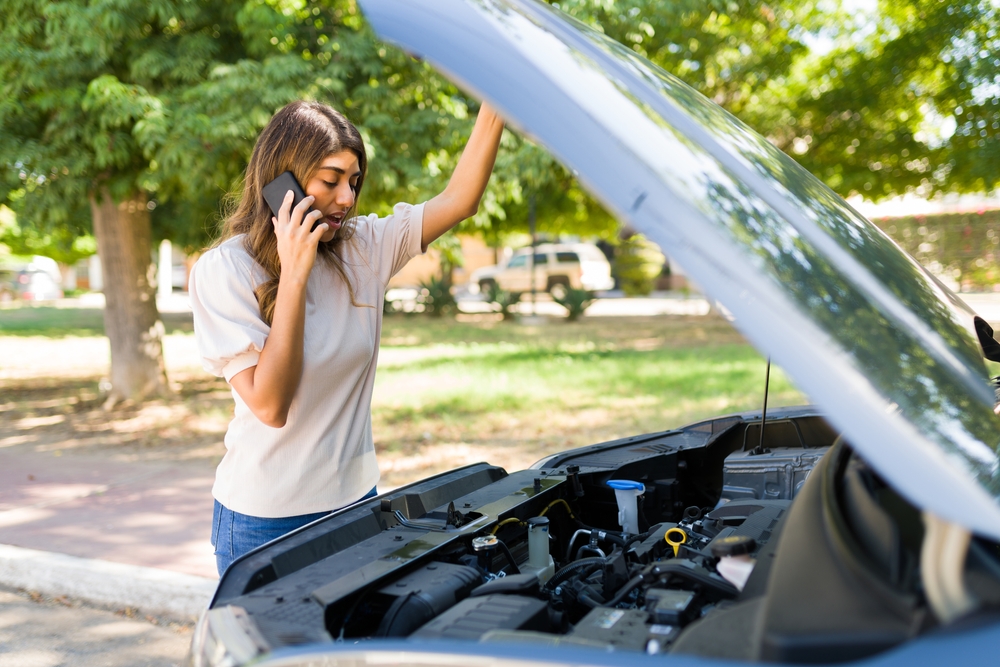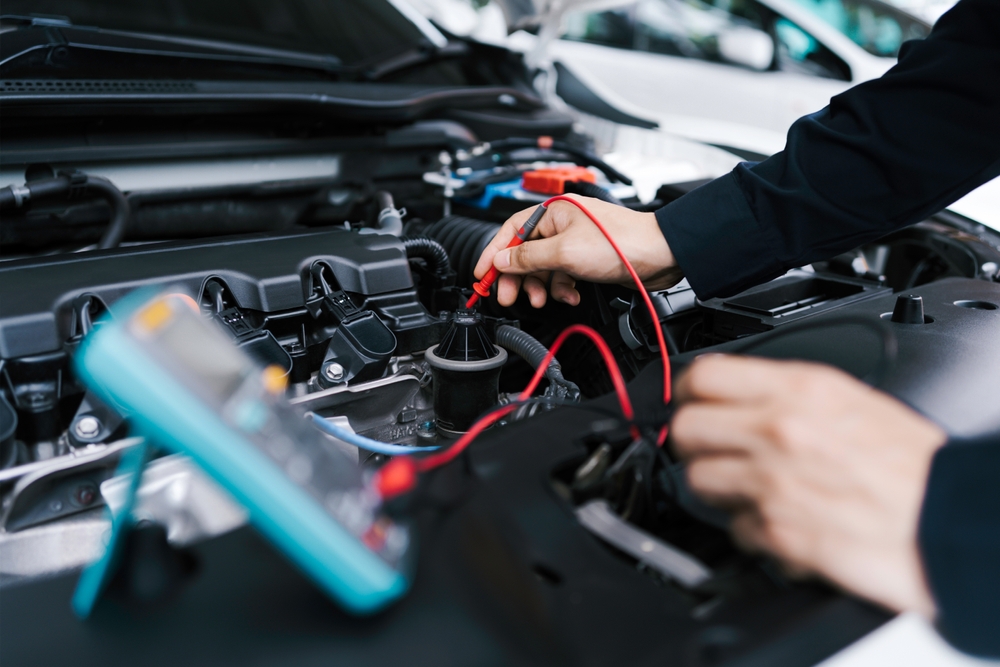Picture this perfectly: you’re cruising down I-40 from Knoxville toward Great Smoky Mountains National Park on a crisp October morning, eager to catch the peak fall foliage around Cataract Falls. The leaves are painting the landscape in brilliant reds and golds, and your camera is ready to capture those Instagram-worthy shots. But suddenly, your Nissan sputters to a halt just past the Gatlinburg exit. What started as an exciting autumn adventure quickly turns into a frustrating roadside emergency that could have been completely avoided.
Fall road trips to the Smokies from Knoxville are practically a local tradition, especially when temperatures drop from summer’s sweltering 88°F highs to those perfect mid-70s October days. But here’s what many East Tennessee drivers don’t realize: those same temperature changes that make driving so pleasant can actually stress your Nissan’s battery in ways that catch you completely off guard. At Ted Russell Nissan Service, we’ve seen too many families miss out on those magical Smokies moments simply because they overlooked one crucial detail before hitting the road.
Why Your Nissan’s Battery Health Matters for a Trip to the Smokies
The 45-minute drive from Kingston Pike to the park’s Gatlinburg entrance might seem straightforward, but it actually puts increased demands on your Nissan’s electrical system. Unlike your daily commute around Knoxville’s relatively flat terrain, the winding mountain roads leading into the Smokies require your engine to work considerably harder. Your battery supplies the initial power surge needed to start your engine each time you stop at scenic overlooks, visitor centers, or those irresistible roadside apple butter stands.
What makes this particularly challenging is how East Tennessee’s fall weather patterns affect battery performance. When Knoxville experiences those dramatic temperature swings—from 75°F afternoons to 45°F mornings—your battery’s chemical reactions slow down significantly. The colder it gets, especially during those crisp early morning departures that serious leaf-peepers prefer, the harder your battery has to work to deliver the same power. This is why cars that start perfectly fine in your West Knoxville driveway might struggle at higher elevations where temperatures can drop another 10-15 degrees.
Additionally, modern Nissan vehicles rely heavily on sophisticated electronic systems for everything from fuel injection timing to safety features like automatic emergency braking. A weakening battery doesn’t just affect your ability to start the engine—it can interfere with these critical systems, potentially compromising your safety on those narrow, winding Smoky Mountain roads where you need every safety feature working flawlessly. That’s why professional battery testing and replacement services become so important before any mountain adventure.
Signs Your Car Battery Might Not Be Ready for the Mountains
Your Nissan typically gives you subtle warnings before a complete battery failure, but these signs become much more pronounced when you’re preparing for mountain driving. The most common early indicator is a sluggish engine crank, particularly noticeable on those cool Knoxville mornings when temperatures dip below 60°F. If you notice your engine cranking more slowly than usual, especially if it takes longer than normal to fully start, your battery might be losing its ability to deliver peak power.
Pay close attention to your headlights, especially during those early morning starts when you’re trying to beat the crowds to prime foliage viewing spots. Dim headlights while idling or headlights that brighten noticeably when you rev the engine are classic signs that your battery can’t maintain consistent power output. This becomes critically important on mountain roads where visibility is already reduced by dense forest canopy and frequent fog.
Here are the most reliable warning signs to watch for:
- Slow engine cranking: Your engine turns over more slowly than normal, especially in cooler weather
- Dim dashboard lights: Interior lights appear dimmer than usual when starting the vehicle
- Electronic accessories acting up: Your radio, GPS, or phone charger works inconsistently
- Check engine light: This can sometimes indicate battery-related electrical issues
- Clicking sounds: Rapid clicking when you turn the key often signals insufficient battery power
- Swollen battery case: Extreme temperatures can cause physical battery damage
- Corrosion around terminals: White, ashy buildup around battery connections reduces efficiency
Temperature sensitivity is another crucial warning sign that many Knoxville drivers overlook. If your Nissan starts fine on warm afternoons but struggles during cooler mornings, even if the temperature difference is just 10-15 degrees, your battery is likely nearing the end of its useful life. This becomes especially important when planning mountain trips where temperatures can vary dramatically between the valley floor and higher elevations.
How Fall Temperatures in Knoxville Can Affect Your Nissan’s Battery
East Tennessee’s autumn weather creates particularly challenging conditions for automotive batteries, and understanding these effects helps you prepare accordingly. During October and November, Knoxville typically sees morning temperatures around 45-50°F, climbing to comfortable mid-70s by afternoon. These temperature swings, while pleasant for humans, create stress cycles that accelerate battery aging.
Cold temperatures slow down the chemical reactions inside your battery, reducing its available power output by as much as 20% when temperatures drop below 50°F. This is why your Nissan might crank slowly on those crisp morning departures to the Smokies, even if the battery seemed perfectly fine during warmer weather. The effect becomes more pronounced at higher elevations—by the time you reach Clingmans Dome at 6,643 feet, temperatures can be 15-20 degrees colder than they were in Knoxville.
Hot weather earlier in the year also contributes to fall battery problems. Knoxville’s typical summer temperatures, often reaching the high 80s with humidity making it feel even hotter, cause battery fluid to evaporate and internal components to degrade faster. A battery that was stressed during July and August heat waves becomes particularly vulnerable when fall temperature fluctuations begin.
The mountainous terrain around the Smokies adds another layer of challenge. Climbing those steep grades from Gatlinburg up to Newfound Gap requires your alternator to work harder, putting additional strain on an already-weakened battery. If your battery is borderline, the combination of cold morning temperatures and demanding mountain driving can push it past its breaking point, often at the most inconvenient possible moment. This is exactly why mobile service options exist—though you’d much rather avoid needing roadside assistance in the first place by preparing proactively.
Proactive Steps to Ensure Your Nissan’s Battery is in Peak Condition
Taking proactive measures to maintain your Nissan’s battery health pays huge dividends in reliability, especially before longer trips to the Smokies. Start by visually inspecting your battery terminals every few weeks, looking for any white, chalky corrosion buildup that can interfere with electrical connections. Clean terminals ensure your battery can deliver maximum power, which becomes critically important when starting in cold weather.
Pay attention to your driving patterns around Knoxville, as they significantly impact battery longevity. Short trips—like running errands around Turkey Creek or quick drives to the Old City—don’t allow your alternator enough time to fully recharge the battery after startup. If most of your driving consists of these short hops, your battery gradually becomes undercharged, making it more susceptible to failure during demanding situations like mountain driving.
Temperature management makes a substantial difference in battery performance. When possible, park in shaded areas during hot summer days to reduce heat stress, and consider using a garage during winter months to minimize cold-weather strain. If you’re planning an early morning departure for the Smokies, try to keep your vehicle in a slightly warmer environment overnight to help ensure reliable starting.
Regular professional testing provides the most accurate assessment of your battery’s condition. Most automotive batteries last between three to four years under normal conditions, but Tennessee’s climate can accelerate this timeline. Having your battery load-tested annually after the three-year mark helps identify weakening performance before it becomes a roadside emergency. Ted Russell Nissan Service offers comprehensive oil and filter change services that include complimentary battery inspections, making it easy to stay on top of all your vehicle’s maintenance needs during a single convenient visit.
Don’t Get Stranded: The Benefits of a Professional Battery Check
Professional battery testing at Ted Russell Nissan Service provides insights that go far beyond what you can determine with a simple visual inspection. Our certified Nissan technicians use advanced diagnostic equipment to measure not just your battery’s current charge level, but also its ability to maintain power under load—exactly the kind of demand you’ll encounter starting your engine at scenic overlooks throughout the Smokies.
A comprehensive battery check evaluates several critical factors that affect reliability. Load testing simulates the electrical demands of actually starting your engine, revealing whether your battery can deliver sufficient power even when stressed by cold temperatures or extended use of electrical accessories. This testing often identifies batteries that seem fine under normal conditions but will fail when you need them most.
Professional inspection also examines the entire charging system, including your alternator’s ability to properly recharge the battery while driving. This becomes particularly important on longer trips where you might be using GPS navigation, charging devices, and running climate control systems simultaneously. A marginal alternator that works fine around town might not keep up with these demands during an extended mountain driving adventure.
Ted Russell Nissan Service offers complimentary battery inspections as part of our commitment to keeping Knoxville families safely on the road. This service includes testing battery capacity, examining connections for corrosion, and evaluating the charging system’s overall performance. When you know your battery’s true condition before departing for the Smokies, you can drive with confidence rather than crossing your fingers and hoping everything works out.
Genuine Nissan Batteries: The Right Choice for Your New Nissan
When it comes time to replace your Nissan’s battery, choosing genuine Nissan parts ensures optimal performance and reliability specifically engineered for your vehicle. Genuine Nissan Batteries are designed to meet the exact electrical specifications and physical dimensions required by your specific Nissan model, ensuring proper fit and maximum performance under all driving conditions.
Generic aftermarket batteries might seem like an economical choice, but they often compromise on quality in ways that become apparent over time. Genuine Nissan batteries undergo rigorous testing to ensure they can handle the electrical demands of your vehicle’s sophisticated systems, from advanced safety features to infotainment systems. This testing includes verification that they’ll perform reliably in Tennessee’s challenging climate conditions.
Capacity matching is another crucial advantage of genuine Nissan batteries. Your vehicle’s electrical system was designed around specific power requirements, and using a battery with incorrect capacity can strain other components or provide insufficient power for reliable operation. This becomes particularly important in newer Nissan models with advanced features like intelligent all-wheel drive or hybrid powertrains.
Genuine Nissan batteries also come with comprehensive warranty coverage that provides peace of mind for your investment. When you choose authentic Nissan parts installed by Nissan Express Service technicians, you’re protected against defects and premature failure, ensuring your battery will reliably power your adventures to the Smokies for years to come.
Battery Performance Comparison for Different Driving Scenarios
| Driving Scenario | Battery Demand Level | Temperature Impact | Recommended Action |
|---|---|---|---|
| Daily Knoxville commuting | Moderate | Standard seasonal variation | Annual battery inspection |
| Short trips around town | High (frequent starts) | Minimal temperature stress | Monitor charging system |
| Highway driving to Nashville | Low (sustained operation) | Consistent temperature | Standard maintenance schedule |
| Mountain driving to Smokies | Very High | Extreme temperature variation | Pre-trip battery testing |
| Winter cold weather starts | Maximum | Severe power reduction | Professional load testing |
Frequently Asked Questions About Nissan Battery Service
Q: How often should I have my Nissan’s battery checked?
A: We recommend having your battery professionally inspected at least once a year, or every six months if your battery is over three years old. If you frequently take trips to the Smokies or do a lot of stop-and-go city driving around Knoxville, more frequent checks help ensure reliability.
Q: What are the signs of a failing battery in a newer Nissan model?
A: Even in newer Nissans, watch for slow engine cranking, dim headlights while idling, dashboard warning lights, or electronic accessories that work intermittently. Modern Nissans have sophisticated electrical systems that can mask battery problems until they become severe.
Q: Is it possible for a car battery to work fine one day and be dead the next?
A: Absolutely. While batteries usually give some warning signs, they can fail suddenly, especially when stressed by extreme temperatures or high electrical demands. This is why pre-trip battery testing is so important for mountain driving adventures.
Q: How long does a typical car battery last in Tennessee?
A: In Tennessee’s climate, most car batteries last between three to four years. The combination of hot, humid summers and variable winter temperatures can shorten battery life compared to more moderate climates. Regular professional testing after the three-year mark helps identify replacement needs before failure occurs.
Q: What is included in a complimentary battery inspection at Ted Russell Nissan?
A: Our comprehensive inspection includes load testing to measure power delivery capacity, visual examination of terminals and connections for corrosion, testing of the charging system to ensure proper alternator function, and evaluation of battery age and condition. We provide a detailed report of findings and recommendations for maintaining optimal performance.
Schedule Your Complimentary Battery Inspection Today
Don’t let a dead battery ruin your fall adventure in the Smokies. The factory-trained experts at Ted Russell Nissan Service are here to ensure your battery is ready for mountain driving, whether you drive a brand-new Nissan Altima or a trusted Rogue that’s been serving your family reliably for years. We have the right diagnostic equipment, genuine Nissan batteries, and specialized knowledge to handle any battery concern efficiently and effectively.
With Knoxville’s fall temperature swings from mid-70s afternoons to 45-degree mornings and the demanding mountain terrain of the Smokies, waiting to address battery concerns only increases your risk of getting stranded when you need reliability most. Our comprehensive battery inspection identifies exactly what your electrical system needs, ensuring you get appropriate service that provides dependable starting power rather than just hoping your battery holds up during your next adventure.
Or visit us at Ted Russell Nissan Service Center, 8565 Kingston Pike, Knoxville, TN 37919, and let our certified technicians ensure your Nissan is ready for all your East Tennessee adventures.




